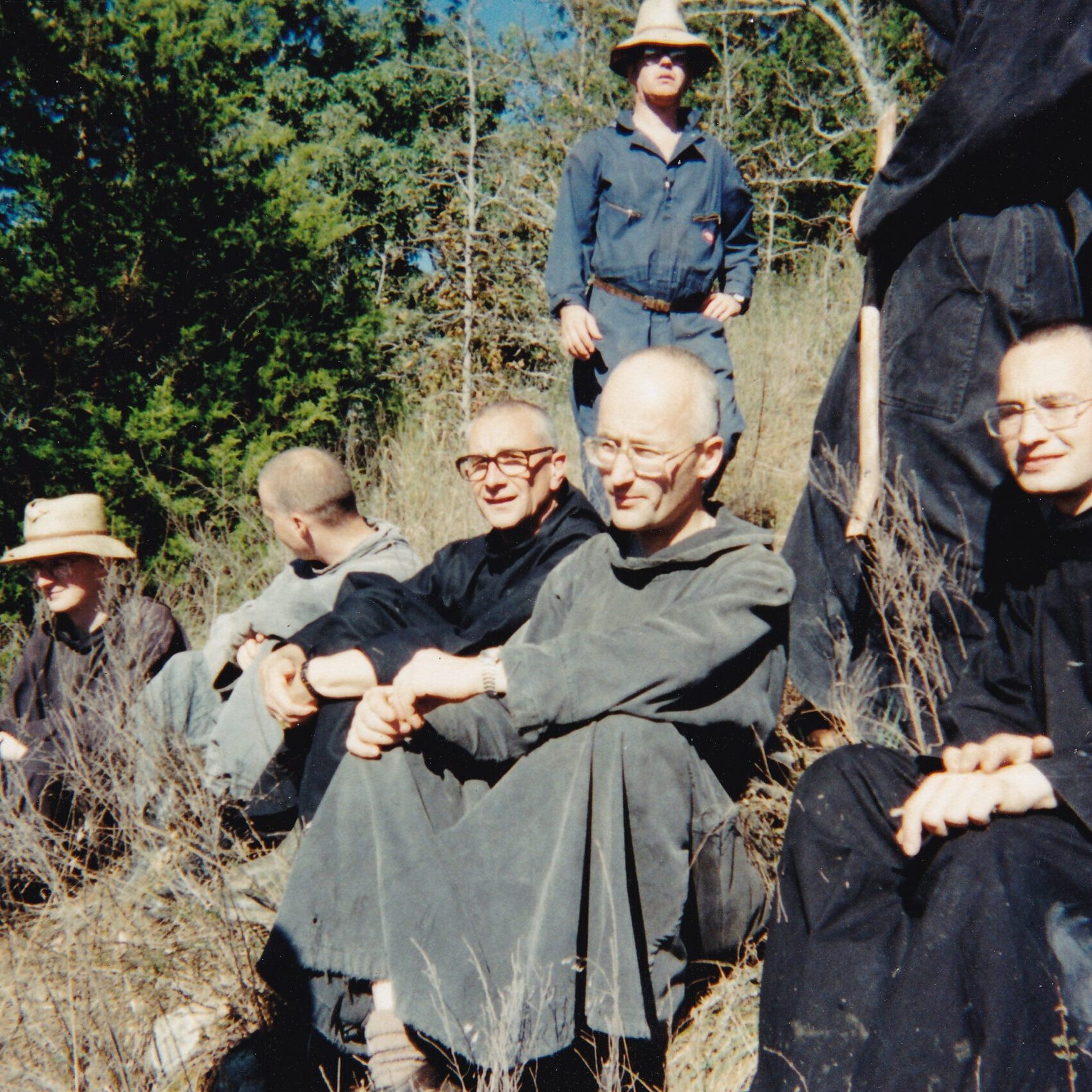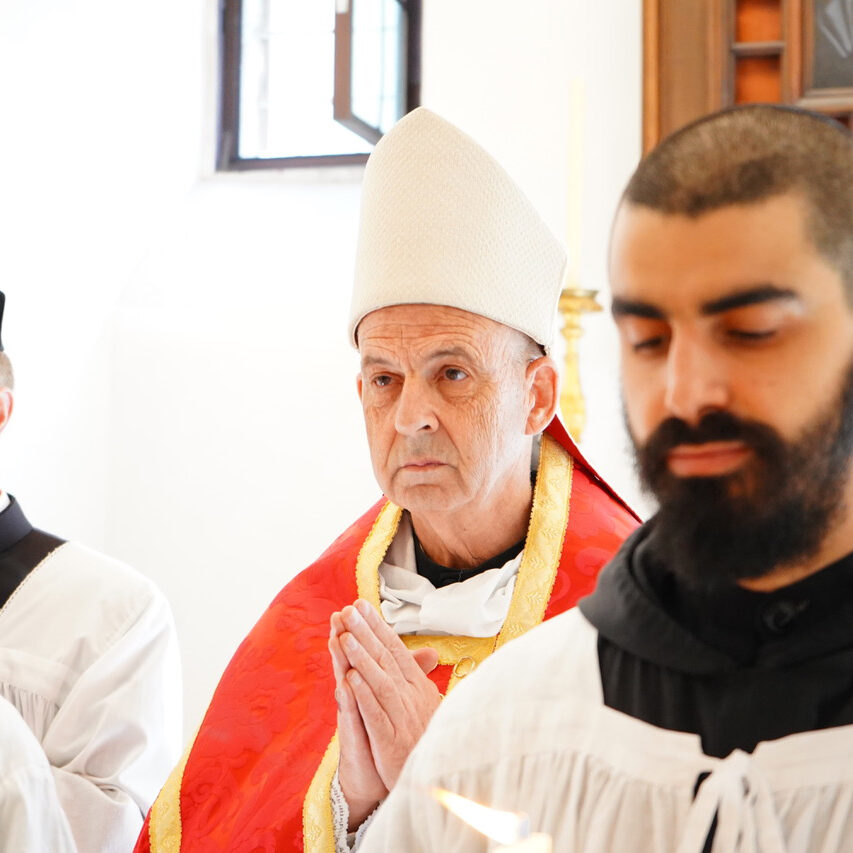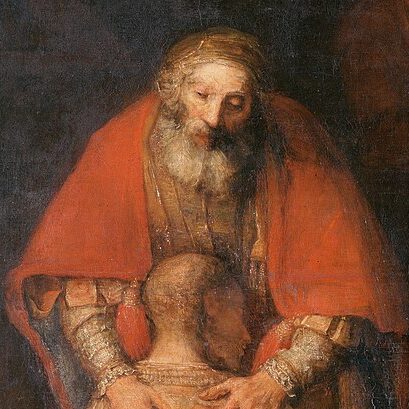Dear Friend of Clear Creek Abbey,
The Gospel sometimes speaks to us of economic matters. Such is the passage we read on the Feast of Saint Benedict.
At that time, Peter said to Jesus: Behold we have left all things and have followed Thee; what therefore shall we have?… (Mt. 19:27 and following)
The Lord tends to be rather uncompromising in this area: what is basically asked of us is to give it up — all of it — to the very last dime. Jesus simply will have nothing to do with us if we insist on keeping half. “If thou wilt be perfect, go sell what thou hast, and give to the poor, and thou shalt have treasure in heaven: and come, follow me …” (Mt. 19:21)
The same teaching is stated more succinctly in another parable, the one concerning the treasure that a man finds in a field. In order to enter into possession of this treasure, he must go out and sell everything he has. The precious pearl is obtained in the same ‘reckless’ manner. This manner is not without a kind of radicalism, seeming to contradict earthly prudence. But, of course, the Gospel ever transcends our earthly calculations.
Now Saint Peter, especially before the Passion and Resurrection of Christ, before he was strengthened by the coming of the Holy Ghost at Pentecost, had a particularly down-to-earth sense of things. Having managed somehow to fulfill the requirement about selling everything (although he seems to have retained a few nets …), Peter presses Christ about the reward. Behold we have left all things and have followed Thee; what therefore shall we have?
One might expect the Lord to have pointed out the rather self-centered nature of his request. Peter, why dost thou seek thine own profit? Trust thou in Me, and all will go well for thee. Instead, Christ makes the most incredible promise: He guarantees a return on Peter’s “investment” of one hundred times the principal. “You that have followed me … shall sit on twelve seats judging the twelve tribes of Israel. And every one that hath left house, or brethren, or sisters, or father, or mother, or wife, or children, or lands for my name’s sake, shall receive a hundredfold …” (Mt. 19: 28-29) In our day a person is fortunate to earn five percent on any investment, and here we see evangelical poverty earning a profit of one hundred times the initial stake!
The worldly-wise will smile at all of this, pointing out that such transactions have nothing to do with the real world. The monks reply by pointing to the thousands upon thousands of men and women, who, across the Christian centuries, have abandoned family, lands and possessions to receive the literal and (quite) mathematical hundredfold in return. Leaving behind the one acre lot in town or even the one hundred acre farm, they join a monastery possessing many hundreds or even thousands of acres. Having left one brother at home, they join one hundred brethren wearing the monastic cowl.
In refutation of this unexpected argument, the skeptical man, slightly irritated at this point, will counter with what he believes to be a telling and peremptory remark: “All right, you can boast of all these things that the monastic community might have, but what joy is there in possessing these lands as part of an oversized family, as a pawn in the monastic army? I would prefer,” he says, rubbing it in, “my own little acre of land.” To this we monks can only say, “Brother, you are close to the Kingdom.” In effect, having a hundred acres instead of one is really no decisive advantage. The mere multiplication of things is no great blessing in itself. The promised hundredfold is just a small part, we see, of a more considerable acquisition. The real bargain here is concluded with the last words of Jesus’ reply to Peter: “… [he] shall receive a hundredfold and shall possess life everlasting” (ibid.) Now we are talking seriously. Here is the bargain worth our human toil and tears.
But what if you are not a monk or a nun? In a time of economic uncertainty, the more pressing need of earthly possessions seems to oblige us to postpone the “eternal life” dimension, as our day-to-day existence forces us to “make ends meet.” The Christian living in the world (but not of the world) cannot afford literally to sell everything. From this perspective the hundredfold appears rather elusive, and the eternal recompense a very distant dream.
The answer is simply that the Beatitude of the poor in spirit is primarily spiritual and that any man or woman, with the grace of God, can live this spiritual adventure. Anyone can give up attachments to earthly things in favor of the Kingdom of Heaven, even if he or she must continue to be a homeowner. As a wise man once remarked, “Everyone should be a bit monk, and monks should be it entirely.” All of us, monks and those in the world, can be part of what Jesus promised Saint Peter; all can belong to the great “bargain of the stars” that is simply Christian before it is monastic. “For where thy treasure is, there is thy heart also.” (Mt. 6:21)
In thankfulness for your helping us to be “entirely monks,” we promise to include you in the great bargain of the stars. Together we will place our treasures and our hearts where no common thief or mighty modern Caesar can take them or harm them, right in the Heart of Jesus, in the Kingdom of the Father.
In Our Lord and Our Lady of the Annunciation,
+ br. Philip Anderson, abbot
NOTE FROM FATHER CELLARER
From May 21-24 the monks recorded their first CD of Gregorian chant. This CD, to be entitled, Ecce Fiat: the Annunciation should be available sometime this fall.
Dear Friend of Clear Creek Abbey,
The Gospel sometimes speaks to us of economic matters. Such is the passage we read on the Feast of Saint Benedict.
At that time, Peter said to Jesus: Behold we have left all things and have followed Thee; what therefore shall we have?… (Mt. 19:27 and following)
The Lord tends to be rather uncompromising in this area: what is basically asked of us is to give it up — all of it — to the very last dime. Jesus simply will have nothing to do with us if we insist on keeping half. “If thou wilt be perfect, go sell what thou hast, and give to the poor, and thou shalt have treasure in heaven: and come, follow me …” (Mt. 19:21)
The same teaching is stated more succinctly in another parable, the one concerning the treasure that a man finds in a field. In order to enter into possession of this treasure, he must go out and sell everything he has. The precious pearl is obtained in the same ‘reckless’ manner. This manner is not without a kind of radicalism, seeming to contradict earthly prudence. But, of course, the Gospel ever transcends our earthly calculations.
Now Saint Peter, especially before the Passion and Resurrection of Christ, before he was strengthened by the coming of the Holy Ghost at Pentecost, had a particularly down-to-earth sense of things. Having managed somehow to fulfill the requirement about selling everything (although he seems to have retained a few nets …), Peter presses Christ about the reward. Behold we have left all things and have followed Thee; what therefore shall we have?
One might expect the Lord to have pointed out the rather self-centered nature of his request. Peter, why dost thou seek thine own profit? Trust thou in Me, and all will go well for thee. Instead, Christ makes the most incredible promise: He guarantees a return on Peter’s “investment” of one hundred times the principal. “You that have followed me … shall sit on twelve seats judging the twelve tribes of Israel. And every one that hath left house, or brethren, or sisters, or father, or mother, or wife, or children, or lands for my name’s sake, shall receive a hundredfold …” (Mt. 19: 28-29) In our day a person is fortunate to earn five percent on any investment, and here we see evangelical poverty earning a profit of one hundred times the initial stake!
The worldly-wise will smile at all of this, pointing out that such transactions have nothing to do with the real world. The monks reply by pointing to the thousands upon thousands of men and women, who, across the Christian centuries, have abandoned family, lands and possessions to receive the literal and (quite) mathematical hundredfold in return. Leaving behind the one acre lot in town or even the one hundred acre farm, they join a monastery possessing many hundreds or even thousands of acres. Having left one brother at home, they join one hundred brethren wearing the monastic cowl.
In refutation of this unexpected argument, the skeptical man, slightly irritated at this point, will counter with what he believes to be a telling and peremptory remark: “All right, you can boast of all these things that the monastic community might have, but what joy is there in possessing these lands as part of an oversized family, as a pawn in the monastic army? I would prefer,” he says, rubbing it in, “my own little acre of land.” To this we monks can only say, “Brother, you are close to the Kingdom.” In effect, having a hundred acres instead of one is really no decisive advantage. The mere multiplication of things is no great blessing in itself. The promised hundredfold is just a small part, we see, of a more considerable acquisition. The real bargain here is concluded with the last words of Jesus’ reply to Peter: “… [he] shall receive a hundredfold and shall possess life everlasting” (ibid.) Now we are talking seriously. Here is the bargain worth our human toil and tears.
But what if you are not a monk or a nun? In a time of economic uncertainty, the more pressing need of earthly possessions seems to oblige us to postpone the “eternal life” dimension, as our day-to-day existence forces us to “make ends meet.” The Christian living in the world (but not of the world) cannot afford literally to sell everything. From this perspective the hundredfold appears rather elusive, and the eternal recompense a very distant dream.
The answer is simply that the Beatitude of the poor in spirit is primarily spiritual and that any man or woman, with the grace of God, can live this spiritual adventure. Anyone can give up attachments to earthly things in favor of the Kingdom of Heaven, even if he or she must continue to be a homeowner. As a wise man once remarked, “Everyone should be a bit monk, and monks should be it entirely.” All of us, monks and those in the world, can be part of what Jesus promised Saint Peter; all can belong to the great “bargain of the stars” that is simply Christian before it is monastic. “For where thy treasure is, there is thy heart also.” (Mt. 6:21)
In thankfulness for your helping us to be “entirely monks,” we promise to include you in the great bargain of the stars. Together we will place our treasures and our hearts where no common thief or mighty modern Caesar can take them or harm them, right in the Heart of Jesus, in the Kingdom of the Father.
In Our Lord and Our Lady of the Annunciation,
+ br. Philip Anderson, abbot
NOTE FROM FATHER CELLARER
From May 21-24 the monks recorded their first CD of Gregorian chant. This CD, to be entitled, Ecce Fiat: the Annunciation should be available sometime this fall.






